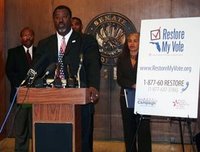
The Minneapolis Star-Tribune reports that a group of “sex offenders” are registering to vote and plan to run for elected office. I put “sex offenders” in quotations because these voters and office-seekers are not currently under supervision for any crime. Instead, they are “civilly committed,” which means that they have either already completed their criminal sentences or, as is the case for over 50 clients, they were never charged as an adult for a sex offense. Although they are euphemistically called “clients” rather than prisoners, most will likely be locked away forever.
How can we continue to lock someone up after they have done their time? The state Department of Corrections generally reviews those convicted of sex crimes at the end of their sentences, referring those deemed dangerous to county attorneys, who may then file a petition for commitment with the district courts. Although civil commitment is rare in many places, Minnesota does this a lot — there are currently about 700 such clients in two secure facilities in the state. How many are released? The program has been in operation for over 20 years, but only 2 people have ever been provisionally discharged from the program.
In a federal class action lawsuit, U.S. District Court Judge Donovan Frank has raised serious questions about the program’s constitutionality. To date, however, the residents/inmates have received little hope or relief and the trial has been pushed back until next year. Given the hyper-stigma surrounding sex offending, few brave souls will act or advocate on behalf of the people in the program. So, they are doing their best to advocate for themselves and to work within what is increasingly acknowledged as a broken system — exercising their rights to vote and seek office.
While the article by Chris Serres and Glenn Howatt contains a wealth of information, they omitted one other factoid that speaks to the program’s sustainability: according to the state Department of Human Services, the per diem cost of the program is $341. This is approximately $125,000 per inmate per year, or roughly four times the cost of the $86 per diem at the state’s correctional facilities. As law professor Eric Janus once put it, “The option of doing nothing would not be responsible from either a legal or fiscal perspective.”


